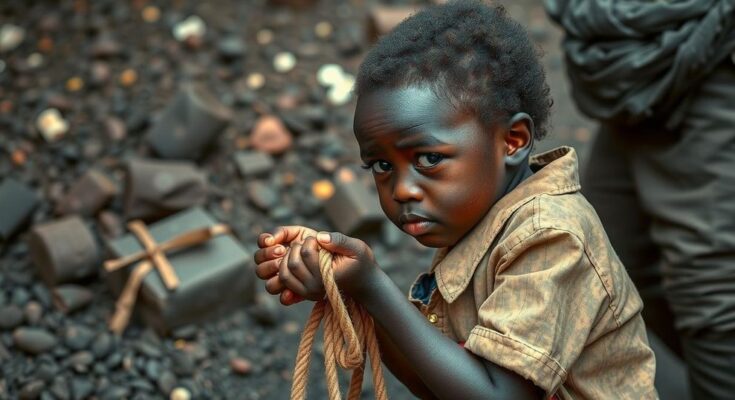The ILO has launched the GALAB Project in the DRC, funded by the USDOL, to eliminate child labor in cobalt mining. This initiative builds upon the previous COTECCO Project and aims to improve child protection and sector accountability. The project will develop remediation services, enhance monitoring practices, and foster public-private partnerships to ensure ethical mining operations, ultimately targeting zero child labor in the industry.
On November 20, 2024, the International Labour Organization (ILO) announced the initiation of the GALAB Project in the Democratic Republic of the Congo (DRC), aiming to combat child labor in the artisanal cobalt mining sector. Funded by the U.S. Department of Labor (USDOL) and expanding on the previous COTECCO Project, the GALAB Project seeks to enhance remediation services for children identified through the Child Labor Monitoring and Remediation System (CLMRS). As the leading supplier of cobalt, a vital mineral for renewable technologies, the DRC faces significant ethical challenges, particularly the prevalent use of child labor in mining activities.
The GALAB Project aims to address these challenges by strengthening the capacity of the Congolese government and various stakeholders to eliminate child labor, thus setting the ambitious target of achieving “zero children in the mining sector.” The initiative will implement a broad array of activities focused on child protection and accountability across the sector. Among its key objectives is the development of services for referred children, utilizing the CLMRS to track and assist over 6,200 identified child laborers currently engaged in mining.
Additionally, the project will collaborate with partners such as UNICEF and IMPACT Transform to facilitate access to educational and vocational training for these children, alongside financial support for their families. A crucial component of GALAB is the enhancement of monitoring practices, equipping labor and mining inspectors with the necessary tools to uphold labor standards and ethical compliance. By fostering public-private partnerships, the project emphasizes the importance of due diligence in mining operations and advocates for responsible business practices.
Nteba Soumano, the ILO Country Director for the DRC, underscored the significance of this project, stating that the GALAB Project marks a pivotal progression in efforts to protect children’s rights within the cobalt supply chain. Through the establishment of strong remediation initiatives, increased accountability within both public and private sectors, and improved collaboration among stakeholders, the GALAB Project aims to ensure fundamental rights and promote sustainable practices in the mining industry.
In summary, the GALAB Project represents a comprehensive approach to tackling child labor in cobalt mining while fostering collaboration across sectors. It is anticipated that the initiative will lead to heightened remediation efforts, a substantial reduction in child labor, and the enhancement of public and private responsibility in the DRC’s mining sector.
The Democratic Republic of the Congo is the world’s largest supplier of cobalt, a crucial mineral for modern technology, particularly in electric vehicles and renewable energy solutions. However, the artisanal and small-scale mining sectors in the DRC are plagued by significant ethical issues, most notably child labor. An estimated 100,000 small-scale miners work under hazardous conditions, raising concerns over human rights violations and the exploitation of children. Initiatives like the GALAB Project are crucial in addressing these systemic issues through enhanced regulatory measures and multi-stakeholder collaboration.
The launch of the GALAB Project by the ILO is a significant step towards eradicating child labor in the DRC’s cobalt mining sector. By strengthening remediation measures, promoting public-private partnerships, and enhancing monitoring and accountability, the project aims to create a safer and more responsible mining environment for children and families. The expected outcomes include improved support for affected children, reduced incidences of child labor, and a commitment to uphold fundamental workers’ rights in the cobalt supply chain.
Original Source: www.ilo.org




